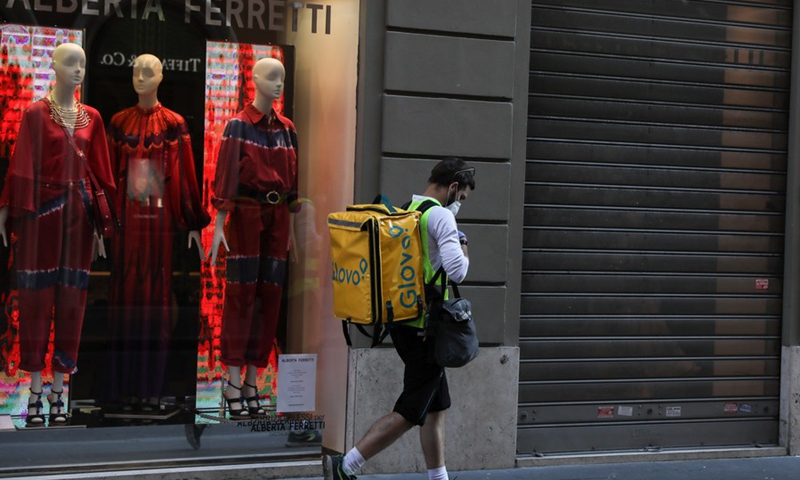
A delivery man prepares to deliver pizzas in Trastevere district in Rome, Italy, on May 2, 2020.(Photo: Xinhua)

A food delivery man wearing a face mask rides pass Via dei Condotti in Rome, Italy, Jan. 27, 2021.(Photo: Xinhua)

A food delivery man walks past shops closed due to the coronavirus pandemic in Rome, Italy, April 11, 2020.(Photo: Xinhua)
The coronavirus pandemic has sparked a boom for companies offering food delivery services. However, Antonello Badessi, one of the longest-working food delivery riders in Rome, said that most of the benefits haven't trickled down to those making deliveries.
Badessi, 57, had worked in an office before switching to delivery work five years ago, just as delivery companies were coming onto the scene. Before that, most restaurants in Italy that offered delivery options employed their own drivers.
What had once been a niche service industry was already becoming mainstream when the first coronavirus lockdown was announced in Italy just over a year ago. The pandemic accelerated the trend.
According to media reports, the size of the food delivery sector in Italy nearly doubled last year. Estimates are that it employs at least 60,000 full- or part-time workers nationally, with combined revenue of more than 900 million euros (1.1 billion U.S. dollars). But Badessi said the pandemic has made a difficult job even tougher.
He mentioned the risks associated with interacting with dozens of people per day -- restaurant workers, fellow delivery drivers, and customers -- during a pandemic. But he said the biggest frustration is economic.
"People read about how much the food delivery sector has grown and they assume business must be good for us drivers," Badessi told Xinhua. "But I'm earning less money now than I did before the pandemic."
He explained that riders are paid for every delivery they make. But despite the increase in the number of overall deliveries, those deliveries are divided between more riders since the economic slowdown sparked by the pandemic has resulted in more people turning to delivery companies for employment.
"Now, if there's a busy night I might make 12 or 15 deliveries," Badessi said. "Before the pandemic, I might deliver 20 meals, maybe more."
Badessi is among a group of delivery riders trying to force the companies they work for to change the way they operate. The group he helped form, Riders Union Roma, is asking companies to formally take the riders on as employees rather than treating them as freelancers, and to pay them by the hour rather than for each delivery.
Badessi, who grew up in Rome, said he's always been an organizer. Even as a child he'd help organize playground activities with other kids. That evolved into organizing social events as a young adult, and then neighborhood associations. Now, during the pandemic, it's the Riders Union Roma.
Badessi believed people will continue ordering food for delivery in high numbers, even after the pandemic has run its course. But he said he doesn't expect the job riders performed to return to the way it was before the arrival of the coronavirus.
"Things are changing, evolving, and every part of the economy has to evolve along with it," he noted.
